Chris Morton's Blog, page 7
November 4, 2021
Project Hush by William Tenn

Project Hush
by William Tenn
I guess I'm just a stickler, a perfectionist, but if you do a thing, I always say, you might as well do it right. Everything satisfied me about the security measures on our assignment except one – the official Army designation.
Project Hush.
I don't know who thought it up, and I certainly would never ask, but whoever it was, he should have known better. Damn it, when you want a project kept secret, you don'tgive it a designation like that! You give it something neutral, some name like the Manhattan and Overlord they used in World War II, which won't excite anybody's curiosity.
But we were stuck with Project Hush and we had to take extra measures to ensure secrecy. A couple of times a week, everyone on the project had to report to Psycho for DD & HA – dream detailing and hypnoanalysis – instead of the usual monthly visit. Naturally, the commanding general of the heavily fortified research post to which we were attached could not ask what we were doing, under penalty of court-martial, but he had to be given further instructions to shut off his imagination like a faucet every time he heard an explosion. Some idiot in Washington was actually going to list Project Hush in the military budget by name! It took fast action, I can tell you, to have it entered under Miscellaneous "X" Research.
Well, we'd covered the unforgivable blunder, though not easily, and now we could get down to the real business of the project. You know, of course, about the A-bomb, H-bomb and C-bomb because information that they existed had been declassified. You don't know about the other weapons being devised – and neither did we, reasonably enough, since they weren't our business – but we had been given properly guarded notification that they were in the works. Project Hush was set up to counter the new weapons.
Our goal was not just to reach the Moon. We had done that on 24 June 1967 with an unmanned ship that carried instruments to report back data on soil, temperature, cosmic rays and so on. Unfortunately, it was put out of commission by a rock slide.
An unmanned rocket would be useless against the new weapons. We had to get to the Moon before any other country did and set up a permanent station – an armed one – and do it without anybody else knowing about it.
I guess you see now why we on (damnthe name!) Project Hush were so concerned about security. But we felt pretty sure, before we took off, that we had plugged every possible leak.
We had, all right. Nobody even knew we had raised ship.
* * * * *
We landed at the northern tip of Mare Nubium, just off Regiomontanus, and, after planting a flag with appropriate throat-catching ceremony, had swung into the realities of the tasks we had practiced on so many dry runs back on Earth. Major Monroe Gridley prepared the big rocket, with its tiny cubicle of living space, for the return journey to Earth which he alone would make.
Lieutenant-colonel Thomas Hawthorne painstakingly examined our provisions and portable quarters for any damage that might have been incurred in landing.
And I, Colonel Benjamin Rice, first commanding officer of Army Base No. 1 on the Moon, dragged crate after enormous crate out of the ship on my aching academic back, and piled them in the spot two hundred feet away where the plastic dome would be built.
We all finished at just about the same time, as per schedule, and went into Phase Two.
Monroe and I started work on building the dome. It was a simple pre-fab affair, but big enough to require an awful lot of assembling. Then, after it was built, we faced the real problem – getting all the complex internal machinery in place and in operating order.
Meanwhile, Tom Hawthorne took his plump self off in the single-seater rocket which, up to then, had doubled as a lifeboat.
The schedule called for him to make a rough three-hour scouting survey in an ever-widening spiral from our dome. This had been regarded as a probable waste of time, rocket fuel and manpower – but a necessary precaution. He was supposed to watch for such things as bug-eyed monsters out for a stroll on the Lunar landscape. Basically, however, Tom's survey was intended to supply extra geological and astronomical meat for the report which Monroe was to carry back to Army HQ on Earth.
Tom was back in forty minutes. His round face, inside its transparent bubble helmet, was fish-belly white. And so were ours, once he told us what he'd seen.
He had seen another dome.
"The other side of Mare Nubium – in the Riphaen Mountains," he babbled excitedly. "It's a little bigger than ours, and it's a little flatter on top. And it's not translucent, either, with splotches of different colors here and there – it's a dull, dark, heavy gray. But that's all there is to see."
"No markings on the dome?" I asked worriedly. "No signs of anyone – or anything – around it?"
"Neither, Colonel." I noticed he was calling me by my rank for the first time since the trip started, which meant he was saying in effect, "Man, have you got a decision to make!"
"Hey, Tom," Monroe put in. "Couldn't be just a regularly shaped bump in the ground, could it?"
"I'm a geologist, Monroe. I can distinguish artificial from natural topography. Besides – " he looked up –"I just remembered something I left out. There's a brand-new tiny crater near the dome – the kind usually left by a rocket exhaust."
"Rocket exhaust?" I seized on that. "Rockets, eh?"
* * * * *
Tom grinned a little sympathetically. "Spaceship exhaust, I should have said. You can't tell from the crater what kind of propulsive device these characters are using. It's not the same kind of crater our rear-jets leave, if that helps any."
Of course it didn't. So we went into our ship and had a council of war. And I do mean war. Both Tom and Monroe were calling me Colonel in every other sentence. I used their first names every chance I got.
Still, no one but me could reach a decision. About what to do, I mean.
"Look," I said at last, "here are the possibilities. They know we are here – either from watching us land a couple of hours ago or from observing Tom's scout-ship – or they do not know we are here. They are either humans from Earth – in which case they are in all probability enemy nationals – or they are alien creatures from another planet – in which case they may be friends, enemies or what-have-you. I think common sense and standard military procedure demand that we consider them hostile until we have evidence to the contrary. Meanwhile, we proceed with extreme caution, so as not to precipitate an interplanetary war with potentially friendly Martians, or whatever they are.
"All right. It's vitally important that Army Headquarters be informed of this immediately. But since Moon-to-Earth radio is still on the drawing boards, the only way we can get through is to send Monroe back with the ship. If we do, we run the risk of having our garrison force, Tom and me, captured while he's making the return trip. In that case, their side winds up in possession of important information concerning our personnel and equipment, while our side has only the bare knowledge that somebody or something else has a base on the Moon. So our primary need is more information.
"Therefore, I suggest that I sit in the dome on one end of a telephone hookup with Tom, who will sit in the ship, his hand over the firing button, ready to blast off for Earth the moment he gets the order from me. Monroe will take the single-seater down to the Riphaen Mountains, landing as close to the other dome as he thinks safe. He will then proceed the rest of the way on foot, doing the best scouting job he can in a spacesuit.
"He will not use his radio, except for agreed-upon nonsense syllables to designate landing the single-seater, coming upon the dome by foot, and warning me to tell Tom to take off. If he's captured, remembering that the first purpose of a scout is acquiring and transmitting knowledge of the enemy, he will snap his suit radio on full volume and pass on as much data as time and the enemy's reflexes permit. How does that sound to you?"
They both nodded. As far as they were concerned, the command decision had been made. But I was sitting under two inches of sweat.
"One question," Tom said. "Why did you pick Monroe for the scout?"
"I was afraid you'd ask that," I told him. "We're three extremely unathletic Ph.D.s who have been in the Army since we finished our schooling. There isn't too much choice. But I remembered that Monroe is half Indian – Arapahoe, isn't it, Monroe? - and I'm hoping blood will tell."
"Only trouble, Colonel," Monroe said slowly as he rose, "is that I'm one-fourthIndian and even that … Didn't I ever tell you that my great-grandfather was the only Arapahoe scout who was with Custer at the Little Big Horn? He'd been positive Sitting Bull was miles away. However, I'll do my best. And if I heroically don't come back, would you please persuade the Security Officer of our section to clear my name for use in the history books? Under the circumstances, I think it's the least he could do."
I promised to do my best, of course.
* * * * *
After he took off, I sat in the dome over the telephone connection to Tom and hated myself for picking Monroe to do the job. But I'd have hated myself just as much for picking Tom. And if anything happened and I had to tell Tom to blast off, I'd probably be sitting here in the dome all by myself after that, waiting …
"Broz neggle!" came over the radio in Monroe's resonant voice. He had landed the single-seater.
I didn't dare use the telephone to chat with Tom in the ship, for fear I might miss an important word or phrase from our scout. So I sat and sat and strained my ears. After a while, I heard "Mishgashu!" which told me that Monroe was in the neighborhood of the other dome and was creeping toward it under cover of whatever boulders were around.
And then, abruptly, I heard Monroe yell my name and there was a terrific clattering in my headphones. Radio interference! He'd been caught, and whoever had caught him had simultaneously jammed his suit transmitter with a larger transmitter from the alien dome.
Then there was silence.
After a while, I told Tom what had happened. He just said, "Poor Monroe." I had a good idea of what his expression was like.
"Look, Tom," I said, "if you take off now, you still won't have anything important to tell. After capturing Monroe, whatever's in that other dome will come looking for us, I think. I'll let them get close enough for us to learn something of their appearance – at least if they're human or non-human. Any bit of information about them is important. I'll shout it up to you and you'll still be able to take off in plenty of time. All right?"
"You're the boss, Colonel," he said in a mournful voice. "Lots of luck."
And then there was nothing to do but wait. There was no oxygen system in the dome yet, so I had to squeeze up a sandwich from the food compartment in my suit. I sat there, thinking about the expedition. Nine years, and all that careful secrecy, all that expenditure of money and mind-cracking research – and it had come to this. Waiting to be wiped out, in a blast from some unimaginable weapon. I understood Monroe's last request. We often felt we were so secret that our immediate superiors didn't even want us to know what we we were working on.
Scientists are people – they wish for recognition, too. I was hoping the whole expedition would be written up in the history books, but it looked unpromising.
* * * * *
Two hours later, the scout ship landed near the dome. The lock opened and, from where I stood in the open door of our dome, I saw Monroe come out and walk toward me.
I alerted Tom and told him to listen carefully. "It may be a trick – he might be drugged …"
He didn't act drugged, though – not exactly. He pushed his way past me and sat down on a box to one side of the dome. He put his booted feet up on another, smaller box.
"How are you, Ben?" he asked. "How's every little thing?"
I grunted. "Well?" I know my voice skittered a bit.
He pretended puzzlement. "Well what? Oh, I see what you mean. The other dome – you want to know who's in it. You have a right to be curious, Ben. Certainly. The leader of a top-secret expedition like this – Project Hush they call us, huh, Ben – finds another dome on the Moon. He thinks he's been the first to land on it, so naturally he wants to –"
"Major Monroe Gridley!" I rapped out. "You will come to attention and deliver your report. Now!" Honestly, I felt my neck swelling up inside my helmet.
Monroe just leaned back against the side of the dome. "That's the Army way of doing things," he commented admiringly. "Like the recruits say, there's a right way, a wrong way and an Army way. Only there are other ways, too." He chuckled. "Lots of other ways."
"He's off," I heard Tom whisper over the telephone. "Ben, Monroe has gone and blown his stack."
"They aren't extraterrestrials in the other dome, Ben," Monroe volunteered in a sudden burst of sanity. "No, they're human, all right, and from Earth. Guess where."
"I'll kill you," I warned him. "I swear I'll kill you, Monroe. Where are they from – Russia, China, Argentina?"
He grimaced. "What's so secret about those places? Go on! - guess again."
I stared at him long and hard. "The only place else –"
"Sure," he said. "You got it, Colonel. The other dome is owned and operated by the Navy. The goddam United States Navy!"
This etext was produced from Galaxy Science Fiction
February 1954. Extensive research did not uncover any evidence that the
U.S. copyright on this publication was renewed.
William Tenn is one of the masters of sci-fi. If you are unfamiliar with his work, check out the amazon page here and his Wikipedia page here.
This story is taken from Project Gutenberg . For legal reasons the following statement must be included: ( This eBook is for the use of anyone anywhere at no cost and with almost no restrictions whatsoever. You may copy it, give it away or re-use it under the terms of the Project Gutenberg License included with this eBook or online at www.gutenberg.org).
October 23, 2021
Seeds by Pamela Zero

Seeds
by Pamela Zero
Jeela held his mother’s hand tightly and squinted into the sky. “I can’t see them, Mommy! Where are they?”
“Patience, honey,” replied Suelsi. “They have to go to the capital first. They’ll be here soon.”
The little boy hopped in place, twisting and turning while holding fast to his parent’s hand. He was dressed in an intricately embroidered tunic with a rainbow of colors stitched into delicate globe shapes. His mother wore a simple white smock and had threaded a white ribbon through her dark hair. They were standing in the town square, surrounded by their friends and neighbors, all of them creating a wild palette of bright colors and white.
“There! There’s one! Is that one?” the boy shouted.
A murmur swept through the crowd, as a few distant, feathery spheres appeared high up in the sky. They rolled overhead, followed by more, until the sky was full of tumbling balls of gossamer. Their paths seemed erratic, but it was clear they were slowly descending, closer and closer.
“They’re here! The Friss are here! Mommy, where are the seeds?” Jeela looked around frantically, and then saw the bundle of sticks topped with seed heads his mother was offering him. “Thanks!” He waved the stalks wildly above his head as his mother lifted him up and sat him on her shoulders. Around them, others were doing the same. In a few moments, the square was filled with bright colors atop white shoulders, with every child clutching their seeds and waving with all their might.
“Thank you!”, shouted Jeela. “Thank you! We are grateful! Thank you!” He glanced around to see his friend from next door a few shoulders over. “Loeter!”
Loeter grinned at him and waved his seeds.
This was the second year that Jeela had come to the square to offer seeds to the Friss. His older sister used to come too, and stand on a chair to get high enough, but she said she was too grown up for that now. Jeela loved wearing his special tunic and shaking the seeds. He especially enjoyed the shouting. Most of the time his mom told him to use his inside voice. Sometimes she said that even when he was outside.
Today he got to shout all he wanted. The louder the better, so the Friss would hear his gratitude. His teacher had said that a while ago everyone all around the world was very sick. Just one Friss had come over from the planet next door and dropped medicine that made people better. Jeela thought that was pretty far away to come all by yourself, even if you were a Friss and had a spaceship. That one Friss saved everyone from dying, but it got too tired after all that work and it died.
He waved his arm faster as he noticed a Friss rolling near him. It dipped closer and he saw the snowflake pattern of its spokes, and the dense area in the center where its brain was. He tried to shout but all that came out was a whisper. “Thank you.” He held out his seeds and the Friss extended a spoke slowly. The end of the spoke curled around the seeds and stripped them off the stalks. Jeela watched in awe as the Friss stored the seeds in its center, then puffed out a small cloud towards him. For a moment, the air smelled like flowers and rain and then the Friss was gone, tumbling up and over back into the sky.
“Mommy! Mommy I did it! I gave it the seeds!”
“Well done, Jeela! Did you say thank you?” Suelsi patted his legs.
“I did but I wasn’t very loud.” He frowned.
“I’m sure it heard you honey. Alright, should we stay for a bit more or do you want to go home and have lunch?”
“Lunch!” Jeela wiggled as his mother lifted him down. He dropped the leftover sticks on the ground as he took his mother’s hand.
The mourners bounced through the atmosphere, buffeted by high altitude winds as they tumbled towards the planet’s surface. There were thousands of them. Gionsly was a peaceful planet, with just one, fairly small, continent. The Friss had made this pilgrimage for years now, ever since their neighboring planet had been struck by a plague. Their fellow Friss, Sll, had taken it upon itself to help, but the cost had been too high. It had died, spokes broken, after scattering the cure it made from its own body into the continental air currents.
The beings that it saved were grateful, and had put up a statue of Sll in their capital city. The statue showed it hale and whole, spokes unbent. At the base was a plaque that blew air scented with the clean, clear smell of Frissian flowers.
Every year this pilgrimage was made. Finding the statue of Sll, was easy. Paying respects was simple, as was layering the scents of the forest around the capital city so Sll’s spirit could rest. The difficult part was visiting the saved beings themselves. They moved quickly and erratically. They didn’t seem to use their sense of smell and their own odors were somewhat difficult to parse. Nonetheless, honor must be shown to those who sacrifice, so the Friss came every year to mourn Sll in the company of the beings it had saved.
This year was Wrr’s first pilgrimage. It was worried. What if it got lost? What if it got hit by one of the lumpy beings? They moved so fast. Wrr focused and made sure to keep up with its group as they layered the smell of fresh moss around the bushes in the capital city. After a while it smelled the scent in the air that signaled the tour of the villages. Wrr rose with its group and headed to the first village on their list.
When they got close to their target, Wrr dropped to the back of the group. It felt a flush of shame, but stubbornly held its position. This high up no one would smell it and it could barely see the lumpy people below. With any luck, all the seeds would be gathered without it having to interact with any of the lumpies. In a few minutes the smell of leaving filled its spokes and it gusted relief in spite of itself. It managed to keep to the back, up high, for the next two villages as well.
The last village twisted into view below. It saw a mass of color and waving seeds. One of the lumpy beings was making a hole in its face, over and over. It looked very agitated and was moving its seeds around at a rapid rate. In spite of Wrr’s caution, it lowered itself down to see if the lumpy was alright. The lumpy stopped moving and its face hole appeared again, but much smaller. Wrr rippled its spokes in a pattern of mourning. The lumpy moved the seeds closer, and Wrr prepared a cloud of Sll’s scents to share sorrow, then took the seeds. The lumpy was still and Wrr released its cloud, full of sadness and pride. It watched the lumpy breathe Sll’s scents in, and felt the power of shared grief.
Wrr rose up and headed to the upper atmosphere. This year’s pilgrimage was done. Sll had been honored, by both races, and it had not shirked its duty completely. It even had seeds to sow in the community garden. It felt its spokes ruffle as it flew, and let a scent of joy and relief waft through the thin air. “Rest well Sll. Be at peace”, it thought. “Worlds of beings honor you.”
Pamela Zero is the author of the Visitor Series, a trilogy featuring people pulled forward hundreds of thousands of years into the future.
You can check out her amazon page here
and her debut novel, the first in the trilogy here.
October 14, 2021
Interview with Ernest Hogan
Interview with Ernest Hogan
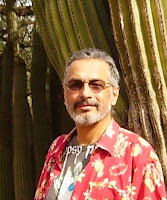
Q. When you were first published in 1990, you were described as one of the up and coming new writers of the decade. Nowadays, however, you’re more widely known as the father of Chicano Science Fiction. How do these two phases differ for you? What can you do now that you couldn’t do then? And vice versa?
A: Actually, my first story sale was in 1982. My first publication of any kind was back in 1969 or 70. I could write something and it could end up on comic book racks all over the country. I started high school knowing I could be a writer, but it wasn’t easy—it was a long, hard guerrilla campaign. It felt like I was thrashing away for centuries when I sold my first novel—which wasn’t the first one I wrote. It’s pretty rare for some to sell their first attempt. The first novel I wrote is still unpublished. . . Maybe, someday . . .
It felt good being called an up-and-comer, but it didn’t last. The publishers—especially the science fiction crowd, didn’t want a wild and crazy guy coming up with new ideas, they wanted “marketable” fantasy epics and space wars. And I’m not getting into the whole Chicano thing yet. . .
This was when Tor was giving million dollar advances to writers like Newt Gingrich.
They told me that Cortez on Jupiter didn’t sell, and when High Aztech came out all kinds of strange things happened:
No review copies were sent out—I kept hearing, “Is your book out? We got books from Tor, and yours wasn’t in the box.” The ad in Locus had no text, just a big, gray, blank space.
The Mexican science fiction magazine Umbralespublished a positive review, so I sent identical letters to my editor and the publisher telling them make sure outlets in border towns were stocked with it, because people will be coming up from Mexico to buy it, both letters came back unopened, stamped RETURN TO SENDER, NO SUCH ADDRESS. I wrote my agent, who confirmed I did have the address right. I asked what could have happened. She wrote back “Gremlins?”
When I was trying to get copies for an autograph session, I called one of my editors, he went to look, excited to help me, and after a long wait, came back confused: “Uh, I don’t know what happened, I was sure we had copies this morning—but now they’re gone.” When I told my agent, she contacted them, assuming the first printing had sold out, and was told, “They didn’t sell—they’re just gone.”
They rejected my next novel, Smoking Mirror Blues. No New York publisher would touch it, Finally, in the year 2000 it was published by Wordcraft of Oregon. I have not been able to sell anything to a New York publisher since.
I tell people that I keep on foot on the underground, so when the shit hits the fan, I’ll have a place to stand.
I don’t really see two phases in my career, the industry thrashed me, but I kept on writing. Chicano, and Latinx readers and academics treat me like a chignón. But I’m not a specialized, ethnic studies writer, I have fans in England, France, Mexico, Russia, and other places. Except for a short time when I got depressed, I never stopped writing. I keep doing new and different things, because just the way I am. It’s how I interact with my environment.
Q. Your first novel, Cortez on Jupiter has become something of an underground cult classic. What was it like being published way back in the day before the internet?
A: It was a totally different world. Most communications were through the physical mail, and it could be weeks before you got a reaction. Then there was the whole process of creating a manuscript with a typewriter, when cut and paste literally meant using scissors and glue, andphysically mailing it. . .
Nowadays, communication with editors is instantaneous. They can demand changes overnight. And I once got a novel rejected twenty minutes after sending it.
The social media makes self-promotion a lot easier. An underground cult classic can become popular faster. Readers can buy books from small presses with a couple of clicks. You can also let people know that you’re still around, and haven’t given up or died.
I was invited to do my column, Chicanonautica, for La Bloga, because of my Facebook activity. Strange Particle Press, who republished my novels, found out about me through La Bloga. This led to academics discovering me.
None of this would have been possible in the pre-internet days.
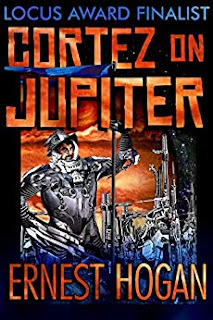
Q. Am I right in saying you’ve only published three novels in the last thirty years? Has this been a deliberate attempt of pacing your writing career out, being in it for the long haul and taking your time?
A: Argh. Nothing in my career happened the way I thought it would. I thought I would dazzle the world with short fiction – if Ray Bradbury and Harlan Ellison could do it, why not me? I didn’t think that being a Chicano would be the big, hairy stumbling block that it turned out to be. I figured by now I’d be rich, famous, and writing whatever I damn well please as a Grand Old Man of Letters.
The publishing biz still doesn’t know what to do with me. Do I really exist? Am I human? Are those rumors of cannibalism and human sacrifice true?
Editors tend to like me, but the corporate entities they have to answer to don’t see any commercial potential in me. Still, there are people who love my work.
I have several unpublished novels. My attempt to write a “straight, commercial novel” was eventually deemed “too weird” for any New York publisher.
So I get published where I can. Usually something out on the fringes, taking advantage of new technology.
Yeah, I’m in it for the long haul. I’m not going away. I’ve given up on trying to please “them” whomever they may be. I have these novels I want to write before I die. And I get new ideas all the time.
But then, I can be distracted if someone wants to make a serious deal for real money...
Q. Your writing style often seems quite ‘train of thought.’ Do you scribble in notebooks and edit later?
A: It’s always gonzo, stream-of-consciousness or screenplay-like image collage with me. My current novel is a gigantic, unholy mess. I always make a mess first. In notebooks and sketchbooks.
I’m dyslexic, and my mom got some bad advice that had her taking things out of my left hand and putting them in my right hand, which messed me up and made my life a lot more interesting than it should have been (thanks, Mom, I love you). If it wasn’t for my superpower of an imagination I would have been doomed.
After I have enough of a mess, I go in and thrash it around until it can be sent off to the markets.
It’s a violent process, not at all pretty.
Q. Do you have a favourite line or paragraph; an excerpt from your writing that you’re particularly fond of?
A: I seem to be quotable. Whenever I see excerpts from my stuff, I’m impressed. Wow, did I really do that?
I don’t dwell on my past work. I’m thinking about what I’m doing now, and I’m always doing something.
I also do great one-liners that I put on Facebook and Twitter. People always say I should make them into stories, but most of the time, one-liners are just one-liners. Occasionally, these have ended up in my writing.
Q. Is ‘alternative writing’ hard to get right? I’ve found from my own experiences that it’s not like music where something unpolished can come across as cool and effective. So I wanted to ask, how do you achieve making your prose so pure, raw and natural, but also readable? Is it a case of the more you work on it, the more natural it sounds?
A: “Alternative” writing? I guess you meant informal, unconventional prose that mimics the words that actually come out of people when they experience life without the usual filters, the kind English majors like, where all the rules are followed to the letter. I find proper prose to be boring. And I didn’t have to spend much time around English majors to figure out that I wasn’t one of them.
What I try to do is make the words come alive. There it is, creative writing in a nutshell.
My dyslexia made learning writing and reading the way they teach it in school difficult. Then I discovered comic books, and soon was reading more and faster than anyone else in my class. I was more interested in comics, television, and movies than books. My approach to prose is more like dialogue or speech than “writing.” (I also tend to start with images and words come tumbling after.) The problem is, the publishing world is ruled by English majors. I work toward an awkward truce.
Q. Which ‘alternative writers’ are you a fan of? Who have you been compared to?
A: Harlan Ellison was a big influence in my early days. The New Wave and experimental writing took me to some interesting places. I like Ishmael Reed, William S. Burroughs, and Guillermo Gómez-Peña. I’ve been compared to both Hunter S. Thompson and Oscar Zeta Acosta (AKA Dr. Gonzo).
Q. You have a new story out in Speculative Fiction For Dreamers: A Latinx Anthology . What can you tell us about that?
A: That’d be “Those Rumors of Cannibalism and Human Sacrifice Have Been Greatly Exaggerated” inspired by my travels in Aztlán (the Southwest). After he has left the U.S.A., a gringo anthropologist gets picked up by a pair of Latinoid truckers who take him on a wild ride.
I’m really proud of this story. I think it’s a prime example of Chicano Science Fiction, reveling in societal mutations and new lifestyles that come about in and around what I call the Latinoid Continuum.
I hope a lot of people read it.
I’d get my hopes up for an award if I hadn’t gotten disgusted with them decades ago.
Q. In fact you’ve had quite a number of short stories published over the years. Who are you most proud to have been published by?
A: I’m proud to have appeared in Amazingand Analog, and to be connected to the tradition of the pulp magazine. Also, I thank Aztlán: A Journal of Chicano Studies for giving me clout in La Cultura.
Q. Your wife is a writer too. Have you ever worked together?
A: Now and then. We are very different writers. We can work in the same room and be in different universes. We’re always bouncing ideas off each other. We have fun together. Our collaborations tend not to sell, We’d probably do more of them if they did.
Q. Okay, last question. You’ve been described as a writer who is both controversial and ahead of his time. Do you think there’s a connection there, or are these simply two different aspects of the effect your stories have?
A: I’m always doing something different. I can’t help it. If I don’t I get bored. I’m also out of sync. Everybody crowds around something, and I drift off, and find something else to focus on. Sometimes these things sell years or decades later. Meanwhile, I’m getting old. I don’t know how many decades I may have left. At least I’m going to have some fun.
Thanks very much for the interview Ernest Hogan.
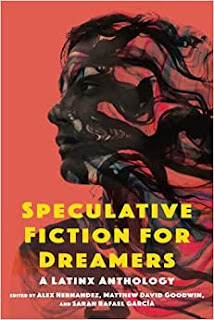
You can check out Ernest Hogan's amazon page here
Connect with him on goodreads here
And find his website here
October 7, 2021
Art - Luca Oleastri
Art - Luca Oleastri
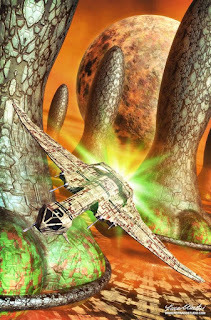
Alien City
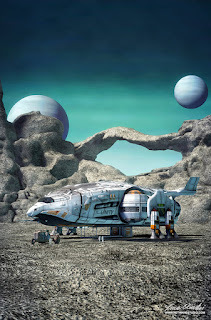
Colony Ship
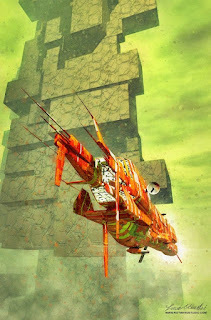
Green Planey

Light City

Solitary
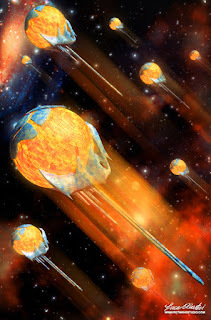
Space Seeds
For more information on Luca Oleastri you can check out the link here.
And connect with him on facebook here
October 2, 2021
The Woman Who Changed Everything by Howard Loring

The Woman Who Changed Everything
Or
A Brief History of Beans
Even as a child, things that grew had fascinated her. Of course, as gathering wild plants was within the female realm, this was fortunate. Other women in the tribe were good at the task, as she became, but she really enjoyed it, as well.
When the foraging parties had left each morning, she dashed ahead, eager, anticipating. If the gathering was good, the women’s baskets were soon full and the young girl was then free to roam on her own. She used that time to look at plants.
It didn’t matter if they weren’t edible. Often the most captivating ones she found were not. She just liked things that grew, for they were always interesting.
As a toddler too young to gather, her chores had included helping, as best she could, the older women as they engaged in cleaning in and about the family’s tent. This involved tagging along as the toothless ones dumped the garbage at one of the various pits the tribe used for the purpose. It was there that the young girl had first noticed the newborn growing things, struggling to live at the pit’s edge.
Why would plants live in such a smelly place, she wondered? Still, they did, pushing their spindly stalks to the sun. They even moved their new, tender leaves towards its direction, and how did the growing things know to do this?
Later, after turning old enough to forage, she discerned even more intriguing things, details the others didn’t notice or care about. They couldn’t be bothered for their only concern was filling their baskets, and looking at things that you couldn’t eat held no fascination for them. She, however, was always captivated.
Her primitive tribe of hunter-gathers had no permanent home but perpetually moved about, yet often as not, if the local game was plentiful and the men and their dogs successful in the hunt, it stayed put for more than a season at a time. And, when this did happen, through all the year the inquisitive girl had carefully noted each change occurring in the many growing things. Soon, no matter the season, she could predict what would happen to them next, and she was always proved correct.
A few times, while still very young, she tried to grow plants but this had never been successful. She’d dug holes and placed sprouts from the pit’s edge into them, but the plants had perished, drying up in days. Then she’d tried planting them closer to the river but these, having little sun, also died.
Undaunted, on the next occasion she once more planted in the sun, but this time she watered the sprouts.
A neighbor boy she knew, whose father was headman of her clan, thought this whole idea very foolish. Why work so hard to grow something that just grew elsewhere? What was the purpose, given you could simply go out and find it?
Still, she persisted and carried out her idea. Because the boy liked her, he feigned interest, and he even helped her tote the water. But the experiment proved inconclusive, for the tribe had traveled on before the outcome became apparent.
She resolved to try again once the proper conditions permitted, but thinking in this next effort of using a different kind of plant.
In the meantime, her life moved forward, as did her wandering tribe. Once the boy became a man, he took her, now a fine woman, as his mate. They were happy.
She quickly became a mother several times over, and for a while this halted her excursions. Yet she never forgot her plan. In fact, she thought of it often as her offspring aged, for each reminded her of how the plants also grew and changed.
When her children were toddlers she resumed her foraging, for they could now accompany her. However, as they demanded much attention, she had no free time to implement her long simmering idea. Yet, once adolescents they began to have chores about the camp, and this at last allowed her to consider it again.
The tribe’s currently claimed area turned out to be bountiful, and the tribal elders, who were the headmen from each clan, announced their decision to stay for as many seasons as the abundant game continued to thrive. So, the young woman judged the time to try once more might never be better. But what growing thing, she constantly wondered, would she endeavor to cultivate in this newest attempt?
Then, one day late in the afternoon, she discovered a peaceful meadow cut by a lazy stream encircled and hidden by the deep, surrounding forest. The open field was thickly covered with many vines that twisted and climbed amidst each other. From long experience she easily recognized these plants, now in full flower.
Soon, she knew, these vines would bear pods, and these pods would then grow the tasty beans so prized by her kind. She also knew that other gatherers would take them if they could, even before they were ripe, for everyone in the tribe enjoyed their hearty flavor. Therefore, the young woman told no one of her find.
Every few days she went back to assess the bean plants, knowing that once the pods ripened they would soon pop open. When they did, of course, the beans were released and fell to the ground, thus becoming harder to gather. So, each day she tried to pick the ripest pods just before they popped, correctly judging from both familiarity and long experience the most opportune moment to harvest them.
Indeed, they were very tasty.
As the pods ripened at various times, her harvest continued for several weeks, but soon almost all of them were gone. She noticed, however, a few of the plants had pods that although ripe had failed to open, as if to protect the beans inside. Finally, when the days turned cold, she picked these now hardened pods, as well.
Yet, she didn’t cook the now sleeping beans they held.
She put these pods, only a handful, in a hollowed-out gourd she used for storage. From time to time she’d crack one open, finding the beans in perfect condition. Once the weather warmed, her long considered plan was fully formed.
She picked a sunny hillside not far from her tent, and set her children to clearing an area sufficient to accommodate her beans, now seeds of the next generation, which numbered well over twice the amount of all her fingers. She then scattered them about, lightly covering them against the birds that also appreciated their delicious flavor. She carefully watered them, and waited.
Yet they did not grow. She resolved to find out why. She then dug up a few and examined them.
They still seemed perfect, and she was confused. Next she decided to visit the original meadow, to see if any beans were growing there this season. None were, but she found something else in the clearing, something quite unexpected.
A strange man, not of her tribe, was there. She abruptly stopped, leery once she finally saw him sitting in the meadow. Yet he only smiled sweetly, and nodded.
She thought of running away, but she didn’t. She sensed no danger, oddly none at all and, after a bit she stepped closer, now only wondering who he was. At her steady, determined approach, the strange man slowly stood.
He was thin and very tall. He was also dressed strangely, for he wore garments unlike any that she had ever seen. No clan she knew of had such an eccentric covering.
“Welcome,” he said to her, “I’ve been waiting for you.”
This statement she didn’t believe. Still, she laughed a bit, for he was a man and she thought him only flirting, as most men would do with any unattended female. Yet the stranger politely persisted, quickly dispelling her misplaced conclusion.
“The ground remains cold,” he informed her, “too cold for your still sleeping seeds. Just have patience. It won’t be long.”
Following this profound pronouncement, she did become wary. The feeling, however, was fleeting and soon passed. She looked him in the face, now highly curious.
“How do you know such?” she asked of him.
The man bid her to sit. He sat also, across from her. Then he smiled again, in reassurance.
“I know many things,” he answered her. “I know of your long interest, and of your newest intent. And,” he added for emphasis,
“I also know your vision is a true one.”
At this, she smiled at him, for under the bizarre circumstances she was compelled to accept this stranger at his word. It was an easy thing for her to do. The woman still didn’t know who he was or why he was helping her, but nevertheless she somehow understood that he had only her best interests in mind.
Indeed he did. He was most eager to assist her, it was his sole, singular goal. The tall stranger was from another Timeframe, and aiding her was his direct mission.
Soon the beans grew. Every evening, she checked on them after her daily chores had been seen to, and shortly others in her clan took notice, as well. Her mate was much amused by all this attention, seeing no real value in her self-imposed, added labors.
Nevertheless, the beans thrived in a perfect growing season. Nothing went amiss. The rain was always gentle and no pest, insect nor animal, attacked her plants.
Now more than her clan was engrossed. Word was spreading. The local men who came to gawk were well entertained by all the heavy interest, as her mate had been, but the hard-working women in the tribe saw and appreciated the inherent advantages.
They offered their help.
The young woman politely refused.
Their labor was currently unneeded, she knew. The strange man in the secret meadow had explained everything in detail.
“Maybe next year,” she said.
Her bean plants soon produced a bumper crop. When this happened, word really spread. Even the most hardened of the tribal men were impressed, for they all loved beans as much as meat, and now they saw the obvious advantage, too.
Beans, after all, while being quite an enjoyable meal were generally hard to come by.
The young woman shared her bounty with her clan, and her mate shared in the gratitude that followed. He was most proud of her. Undeniably, she was a good woman.
She did ask her female kinfolk for help in shelling the beans. It was a big task taking much time, for there were many full baskets of pods. The women sat in a circle as they worked and talked of the future, laughing together at every opportunity.
The beans were carefully graded before being doled out. Many of them were an average size or smaller, and these were the ones equally divided and dispersed, a most succulent bonus. A substantial number, however, were bigger than the average, and the woman kept these back to plant in the next season.
The next season never came. The tribe, after two years, moved on. Sadly, its new territory was heavily wooded and held no area sufficiently suitable for her beans.
She and her mate then argued over them. He wanted to eat her tasty seeds, and he boldly stated they would go bad if they didn’t. She’d always check first, but after finding them still only sleeping, each time she stiffly refused to comply.
Then, in the warming time the tribe suddenly returned to its previous location. The cautious elders now judged moving a hasty mistake. The available game was still plentiful and there was abundant water to be had close by.
The woman staked her rawhide tent by her old, sunny hillside.
Now they came, scores of women from many clans in the tribe. Their mates all wanted tasty beans. Teach us, they pleaded, the secrets of how to grow them.
She did, but she demanded a price. The women would learn by tending her plot, under her instructions, some of every day for a season. She would initiate them, and also give them beans to plant, but only after her harvest was completed.
This was a stiff bargain. Men didn’t like waiting. More importantly, they wouldn’t understand such a strange and novel arrangement, and they’d only see their women working for someone else, an unheard of thing.
The now fully mature and resolute woman replied only, “If we start soon, and the early air is warm enough, we can have two harvests. Your men will have beans later, in the cooling times, but still this season. Or,” she casually added, “only my clan will assist me now, and next season you can ask them for help.”
The tribe’s women saw wisdom in this, for it was a good plan. Enlightening their mates would be a different matter. Still, after using her argument, they did.
This time, there were problems. First there was too much rain, and later the fat, green worms arrived. Luckily, many men, always impatient for beans, came by to check on things and ended up eating most of the juicy insects.
Some plants did die, but many more survived and again there was a bumper crop. As earlier stipulated, the growing season was only halfway done and the mentoring woman then held to her part of the bargain, dispersing seed to her now trained, former helpers. All of the women were excited, and they eagerly rushed home to quickly create their own, small garden plots.
After her second course of beans was planted, she returned to the hidden meadow in hopes that the strange man would still be there. He was. Again they sat.
“You’ve done much good,” he told her.”
“Yes,” the woman concurred, “this is a wonderful thing for the tribe, but I’m most concerned. There are times that I cannot grow tasty beans, for often the forest is too thick and the sun is blocked. Tell me how to raise my plants then.”
The time traveler answered quietly, saying, “You must grow your beans in a new and different way. Your people must have fine fields, always. Your tribe should not move but forever stay, and grow many beans in many fine fields.”
“But men hunt,” she answered him. “They follow the prey to do so. The tribe will move, it will always move, it must.”
“You can trade for meat,” was his rejoinder, “for other tribes will savor your tasty beans, too. Many tribes would gladly trade good meat for good beans. And your men will be busy with another thing, a vital thing they must do now.”
“What thing,” she asked, “helping grow beans?”
“Not yet,” he instructed. “That will come later, but for now the men must do something else of great importance. They must protect the ones that grow the beans.”
This scenario she understood. Why work for something when it can be taken by force? Many unfriendly tribes would want beans and, not yet knowing how to grow them, they would try to steal them instead, why wouldn’t they?
Still, she had reservations.
“The tribe will always stay,” she asked him, “for beans alone? No, this is too great of a change. This would change everything.”
The stranger slowly nodded, understanding her dilemma. Yet, he also knew that it was just a matter of time. Change always comes, and time will out, regardless.
“Your beans first came from wild beans here,” he said, with a sweep of his arm, indicating the meadow now full of fine grass.
“Yes,” she agreed.
“Yet, if you didn’t take them,” he continued, “the pods would have just popped open, with the beans falling to the ground.”
“Yes,” she said again.
“The beans do this to live,” he said, “so that other beans will come later. But some of the pods did not pop open. Their beans, being trapped, could not grow.”
“Yes,” she said for a third time.
“But now they do grow,” he pointed out. “They can live and thrive because of you. These beans will now feed your tribe, and other plants do much the same thing.”
Again he indicated the field around them. The tall grass there was full of tiny, green seed heads. Strange, she hadn’t noticed them before and she should have.
This particular type of grass was a most delicious plant, too.
“These seed heads must be taken early, before they’re ripe,” he explained. “If not, they will just fall from the stalk in order to grow the next grass. It’s hard to gather then.”
Here she only nodded, knowing from experience it was true.
“But, like your beans,” he said, “some of these stalks will keep their tasty seeds. They won’t fall like the others do. These seeds would never grow, for once the stalk finally fell, the ground itself would then be too cold to welcome them.”
“I see it,” she said, but then she made the larger connection.
The man, realizing this by the look on her face, smiled.
“This grass can also be grown?” she inquired.
“Easily,” he answered, “but plant only the ones with the largest seeds, like you did with your beans. Some of the new seed will be larger still, and you will then save this to plant. Much food can thus be grown and traded by your tribe.”
She traveled home, enthused, but still her mind was troubled. How could she, only a woman, convince the stiff elders to always stay and grow things? She knew not.
Yet, once at her tent she found that great change had already arrived. The clan’s headman, her mate’s father, had died suddenly in the night. The clan members, losing no time, had quickly elected the dead man’s son, her mate, to replace him.
Now her mate was the headman of her clan, and so by extension a member of the tribe’s elders as well, albeit the youngest and most inexperienced of the group.
“We must always stay,” she told him. She then explained the reasons why, the same rationalities the strange man had listed. But her mate was noncommittal.
Trying to sway him, she returned many times to the meadow to pick the ripest seed heads there, for he loved the sweet loafs they always made. The smell of them cooking alone was mesmerizing. Still, he didn’t agree to always stay.
Every time the determined woman returned to gather, she wished again to speak to the tall stranger, but she never did. She couldn’t. Unlike before, he was never there.
One day when the cooling times had arrived, she stood surveying her bean field. The dying plants were now bare of pods, for they had all been harvested. Because of her unwavering efforts, the plot was now just one of many in the tribe and this season they had all produced many tasty beans.
Her mate, returning from the day’s hunt, then approached her.
“When will you tell the elders to always stay?” she demanded.
He sighed, not wanting to argue further.
“To always stay may be a good idea,” he conceded, “but it’s a new idea. And I’m a new elder. They would not listen to me.”
“You are my man,” she said slowly, her eyes hard and her jaw set, “and you should see this my way, it makes good sense. Beans keep, meat does not. They will feed our clan when the cold comes, a good thing if the hunting is bad.”
This blunt statement shocked him at first for he took it as an affront, a commentary on his competence as a provider, but that reaction soon passed. She was a good woman. She spoke the truth and undeniably it was a noble point.
What’s more, he hadn’t even considered this view, a valid advantage. That rankled for as an elder, even a novice one, he always needed to contemplate every option. Yet now, the hard-pressed man only grunted, turned and walked away.
She turned also, back to her dead beans. What else could she possibly do? The woman didn’t know.
Much later he returned to the tent, holding a solemn face.
“I talked to the elders,” he announced. “They agree to always stay, at least for now. The tribe can still move later, if need be.”
Her eyes filled with tears and he took her in his arms. Then she cried outright. Next, her mate tightly hugged her.
“Good thing,” he whispered, “they all love beans.”
Before the cold time started in earnest, she returned to the meadow. The strange man was not there. Something else was though, a gift from him, perhaps.
She noticed dark brown, fully ripened seed heads on several of the grass stalks. These seeds had not been broadcast. She gathered them and then walked home.
To always stay.
HOWARD LORING creates EPIC FABLES on the ELASTIC LIMIT of TIME.
These exciting time travel books encompass universal human themes,
often employing real history.
For more information you can check out his amazon page here.
September 27, 2021
Bookspot - The Bounty Hunter from Mars by Raymond Lozada Negron
Bookspot - The Bounty Hunter from Mars by Raymond Lozada Negron
Durango Loco-y-Peligroso, yes, that's his real name, is a bounty hunter thousands of years in the future. Traveling from planet to planet, galaxy to galaxy, from dimension to dimension, in space and time. He has saved the universe more than a few times, unintentionally, of course, one thing led to another - saving the universe was always an option he was unable to deny.
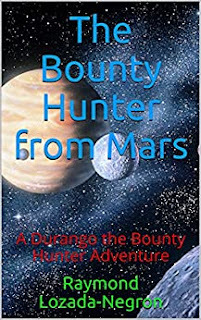
Part One of the trilogy - When Durango the Bounty Hunter is asked to snatch a memory chip from a safety deposit box locked away in a high rise building complex, the fates of two worlds and the future of humankind is literally thrust onto the palm his hand.
September 9, 2021
Outpost 268

Outpost 268
by Chris Morton
Three thousand days alone on this godforsaken hunk of metal in the middle of space, with nothing so much as a passing comet and I’ve murdered my only living companion. But I had to get out of this interminable cycle of nothing – away from the mess I signed up for at the age of twenty-one; naïve; excited over the prospect of leaving my home planet for a life of adventure. A promise of a post aboard a starship after the minimum three years service. They seem to have forgotten me.
Once a week I talk to a computer back on Earth. Nothing to report. Systems at a hundred. What am I waiting for? The sun to explode?
Outpost 268 reporting in.
What is your status?
Status normal.
Observations?
No observations.
Equipment efficiency level?
Fully functional at a hundred percent.
Status of cat?
Alive and well.
Prepare for scan.
I’d move into the cubicle for the full body scan to record my mental and physical well-being.
Recently I’ve begun to suspect that it may not be as accurate as I once thought.
Otherwise, why did I kill the cat?
Over eight years I’ve been here. Checking one section at a time I start with engineering in level A; finish with the observation room. On Friday and then at the weekend, donning my space suit, I examine the outside surface for faults. Once a month a pod arrives with more food supplies. The routine of non-events has at least had some consistency.
Making my way around this tiny excuse for a space station, I’ve hoped against hope for something to go wrong. A sun storm to interfere with the settings. For a crack in the panelling. Stray bolts showing wear. An alien attack even.
If it wasn’t for the cat I would have gone mad a long time ago.
Not talking to myself. I’m conversing with the cat.Its name is Nibbles. Or rather, it was. Used to be. Former name. Former cat.
Nibbles would be hard to find at first. As a kitten it was difficult to get him to eat.
“Nibbles!” I’d shout. “Nibbles … dinner time!”
I’d find him hiding behind a canister in section D. In a bundle of sheets in my living quarters. Or often he’d be high above the space between the lighting and ceiling tiles. Watching me. Observing my every move. Wary but interested in my behaviour.
Once I started to hand-feed him, we began to make a connection. Soon Nibbles was following me everywhere. In the evenings we’d lie on my bed together. I’d massage his head, rubbing the back of his ears. Nibbles used to like that. And his purring would sooth me, provide me with comfort. I was looking after another living being, a life that depended entirely upon my own.
“Breakfast time, Nibbles. How about some milk? Okay, we’d better get to work.”
In the evenings we’d play hide-and-seek.
“Where are you Nibbles? There you are!”
There was a favourite piece of yellow and green tape I’d throw high into the air. The friction of this movement would cause it to crackle. Nibbles would come running into the room, eager to entertain us by chasing, catching and assuring his dominance over the object.
On the last day he knew. We’d spent too long together for there to have been any chance of me fooling him.
“Timeto go,” I said, unable to meet his eyes. “The only way,” I mumbled while he blinked back at me, silent.
“I love you,” I told him, taking hold of his neck. “You love me too, I know you do, but … they’ll be coming for me. Soon … they’ll have to …”
My excuse will be that Nibbles found his way into the waste disposal chute without my knowledge; the truth being that I put him there knowingly, deliberately – an execution, nothing less.
Nibbles didn’t struggle. He trusted me, and I know he was happy to give up his life for mine. As I watched him, watched the body fly into the vacuum of space, I was overcome with sadness for the loss of my only friend.
Silently I held the tears back.
Returning to my room I shave, shower, prepare myself mentally for what I’m going to say. The excuse I will make. And then, with an action that can only be deciphered as a spur of the moment spot of madness, I carve his name (N-I-B-B-L-E-S) into my forearm using a razor blade.
“Outpost 268 reporting in. Status normal. No observations. Equipment efficiency level is fully functional at a hundred percent. The cat however, has died.”
I begin to laugh, more at myself than at the machine in front of me. “It’s dead,” I mutter, then hesitate before confessing that, “I killed it.”
Prepare for body scan.
Moving into the cubicle, I can still hear meowing but for a moment, a future of happiness flashes before my eyes.
September 5, 2021
Interview with Bruce Golden
Interview with Bruce Golden
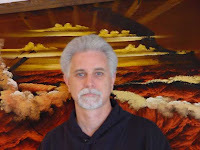
Q. You have quite a lot of short stories out there – your bio reads that you’ve been published ‘over 150 times across a score of countries and 30 anthologies’ and you also have your own collection Dancing with the Velvet Lizard , which includes a modest thirty-three. So how about picking a couple of your favourites to tell us about?
A: I'm very fond of my story "Dead Monster Walking." It was with that tale I created the foundation for the world in which my novella Monster Town would be set. It's a world where old movie monsters were actually real people – just monstrous people who became actors, and once they were no longer needed became relegated to a rundown suburb of Hollywood.
In addition to that story, my book Tales of my Ancestors features at least one of my direct ancestors in every story – stories which are historically accurate except for a speculative element I've added to each. Despite the fantasy and science fiction components, nothing in the tales clashes with historical records, and each could have happened just as I relay them.
My favorites are "Salem's Fall," which doesn't blame the devil for what happened, but shows him as an interested onlooker to the Salem Witch Trials. I wrote this from the perspective of my great (x7) grandfather after I discovered one of the 13 people hung during the witch trials was his first cousin. I also really like my tale "Micagor's Gold" because I was able to include so many historical figures from the Old West, including Wyatt Earp, Bat Masterson, Pat Garrett, and Cochise, among others. In it, a search for gold ends up in the discovery of an alien spacecraft. I also worked in a speculative explanation for the fact that even after dozens of gunfights during his life, Wyatt Earp was never so much as nicked by a bullet.
Q. What was the first story you got published? And also, how did it all start, how did you get into writing?
A: I decided to become a writer of fiction at age 18, but was waylaid after my first year of college when I was drafted into the Army. Post discharge I found various jobs in journalism to pay the bills, and my fiction career was pushed to the back burner. After a few years of trying to get published as a freelancer, I finally sold my article "Swimsuit Optional Zone" in 1977 to The Progressive – a national news and politics magazine. It was about the nation's only legal nude beach. I went on to sell more than 200 freelance articles/columns before limiting myself to writing only fiction. Though I was a semi-finalist/Honorable Mention for the 1988 Writers of the Future contest, my future was a long way off. I didn't sell my first short story until 2001, just before my first novel was published.
Q. Were you a fan of sci-fi as a kid?
A: Yes. My teenage years were nurtured by a steady diet of Robert Heinlein books – which is probably why some people see a similarity to his style in my work. I also read a lot of Mark Twain (who has some sci-fi stories) and Robert Howard's Conan books (which, of course, are fantasy).
Q. In an old interview you mention an apocalyptic novel you spent over twenty years working on. Is the said novel your recent release, After the End ?
A: Yes. Not that I worked on it continuously for 20 years, but it was always in my mind, and I wrote various pieces of it here and there.
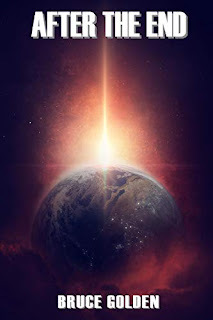
Q. The book is divided into sections, all of which could be novels within themselves. Was it difficult to keep the length of each section down and yet cover all the ground necessary?
A: No, length is rarely a problem with me. I tend to write very short chapters, and do so in a very dialogue-rich cinematic style. At least that's what I've been told. In After The End I wanted to explore different ways people would adapt – what kinds of cultures might emerge – after a collision with a comet wipes out Earth's civilizations and more than 99 percent of its population.
Q. Another of your recent novels is Monster Town , (previously mentioned above) which I’ve heard may become a TV series. Any news on this?
A: I wouldn't exactly say it was stuck in "Development Hell," but I've learned the production of a TV series takes quite a bit of time, and must endure various evolutions. Of course the biggest impediment as been COVID 19, which shut down Hollywood completely for more than a year. The good news is that they still love the idea, and are still working to get it done.
Q. As a life-long film buff and former movie reviewer, how about the state of cinema today? Your thoughts?
A: Leaving aside the effects of COVID for the moment, the good news is that with modern special effects, there's nothing – no science fiction premise – they can't make into a movie these days. The bad news is producers tend to rely too much on special effects and action sequences, and not enough on good writing and storytelling. They believe that's where the money is, and they tend to reduce audiences to the lowest common denominator … which then becomes a self-fulfilling prophesy.
Q. What else can you tell us about your work as a journalist?
A: I think of it as another lifetime ago, now that I only write fiction. But I began as freelance magazine writer, became a magazine editor and art director who was often hired to create brand new publications, then moved to radio where I did a lot of things, including being the station's entertainment/feature reporter. From there I moved on to become a producer of local TV news. Though I wouldn't go back to any of it, it all provided me with a solid foundation as a writer.
Q. What’s the most obscure or unexpected piece of inspiration you’ve had that ended up leading to a story?
A: The strangest connection my brain has made was between a scene in "2001: A Space Odyssey" and an old Cheech and Chong skit titled "Dave's Not Here." In both cases someone won't let Dave in. The short-short bit of satire I wrote combining those two things has been one of my most popular stories, published several times in various countries around the world.
Q. Sounds interesting. So after being a writer for so long, what advice do you have for other writers just starting out?
A: That's hard to say, because all writers – all humans – are different. We all work differently. The standard line is to say, "write, write, and then write some more." That's always good advice. But also read, read, and read plenty in the genre you want to write in. Most of all, write about what interests you. It's hard, lonely work that rarely pays much, so you should at least work on stuff you like.
Q. Fair enough. And as a final question, what are you working on at the moment? Any new stories or novels in the works?
A: I've just finished a novel which I believe covers new ground in science fiction – something not easy to do. I don't want to give away too much, because there's a rather shocking reveal at the end of the first chapter. But I will say it involves artificial intelligence, an alien race, and a deadly virus – with the disclaimer that I began writing this book long before anyone ever heard of COVID 19. If that interests you, keep a lookout for The Omega Legacy.
Thanks very much for the interview Bruce Golden.
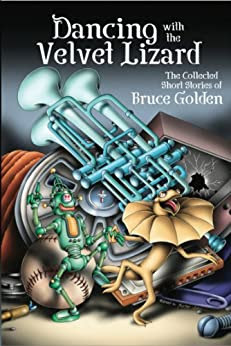
You can find Bruce Golden's amazon page here
connect with him on goodreads here
and on twitter here
September 1, 2021
Postmark Ganymede by Robert Silverberg

Postmark Ganymede
by Robert Silverberg
"I'm washed up," Preston growled bitterly. "They made a postman out of me. Me – a postman!"
He crumpled the assignment memo into a small, hard ball and hurled it at the bristly image of himself in the bar mirror. He hadn't shaved in three days – which was how long it had been since he had been notified of his removal from Space Patrol Service and his transfer to Postal Delivery.
Suddenly, Preston felt a hand on his shoulder. He looked up and saw a man in the trim gray of a Patrolman's uniform.
"What do you want, Dawes?"
"Chief's been looking for you, Preston. It's time for you to get going on your run."
Preston scowled. "Time to go deliver the mail, eh?" He spat. "Don't they have anything better to do with good spacemen than make letter carriers out of them?"
The other man shook his head. "You won't get anywhere grousing about it, Preston. Your papers don't specify which branch you're assigned to, and if they want to make you carry the mail – that's it." His voice became suddenly gentle. "Come on, Pres. One last drink, and then let's go. You don't want to spoil a good record, do you?"
"No," Preston said reflectively. He gulped his drink and stood up. "Okay. I'm ready. Neither snow nor rain shall stay me from my appointed rounds, or however the damned thing goes."
"That's a smart attitude, Preston. Come on – I'll walk you over to Administration."
Savagely, Preston ripped away the hand that the other had put around his shoulders. "I can get there myself. At least give me credit for that!"
"Okay," Dawes said, shrugging. "Well – good luck, Preston."
"Yeah. Thanks. Thanks real lots."
He pushed his way past the man in Space Grays and shouldered past a couple of barflies as he left. He pushed open the door of the bar and stood outside for a moment.
It was near midnight, and the sky over Nome Spaceport was bright with stars. Preston's trained eye picked out Mars, Jupiter, Uranus. There they were – waiting. But he would spend the rest of his days ferrying letters on the Ganymede run.
He sucked in the cold night air of summertime Alaska and squared his shoulders.
* * * * *
Two hours later, Preston sat at the controls of a one-man patrol ship just as he had in the old days. Only the control panel was bare where the firing studs for the heavy guns was found in regular patrol ships. And in the cargo hold instead of crates of spare ammo there were three bulging sacks of mail destined for the colony on Ganymede.
Slight difference, Preston thought, as he set up his blasting pattern.
"Okay, Preston," came the voice from the tower. "You've got clearance."
"Cheers," Preston said, and yanked the blast-lever. The ship jolted upward, and for a second he felt a little of the old thrill – until he remembered.
He took the ship out in space, saw the blackness in the viewplate. The radio crackled.
"Come in, Postal Ship. Come in, Postal Ship."
"I'm in. What do you want?"
"We're your convoy," a hard voice said. "Patrol Ship 08756, Lieutenant Mellors, above you. Down at three o'clock, Patrol Ship 10732, Lieutenant Gunderson. We'll take you through the Pirate Belt."
Preston felt his face go hot with shame. Mellors! Gunderson! They would stick two of his old sidekicks on the job of guarding him.
"Please acknowledge," Mellors said.
Preston paused. Then: "Postal Ship 1872, Lieutenant Preston aboard. I acknowledge message."
There was a stunned silence. "Preston?Hal Preston?"
"The one and only," Preston said.
"What are you doing on a Postal ship?" Mellors asked.
"Why don't you ask the Chief that? He's the one who yanked me out of the Patrol and put me here."
"Can you beat that?" Gunderson asked incredulously. "Hal Preston, on a Postal ship."
"Yeah. Incredible, isn't it?" Preston asked bitterly. "You can't believe your ears. Well, you better believe it, because here I am."
"Must be some clerical error," Gunderson said.
"Let's change the subject," Preston snapped.
They were silent for a few moments, as the three ships – two armed, one loaded with mail for Ganymede – streaked outward away from Earth. Manipulating his controls with the ease of long experience, Preston guided the ship smoothly toward the gleaming bulk of far-off Jupiter. Even at this distance, he could see five or six bright pips surrounding the huge planet. There was Callisto, and – ah– there was Ganymede.
He made computations, checked his controls, figured orbits. Anything to keep from having to talk to his two ex-Patrolmates or from having to think about the humiliating job he was on. Anything to –
"Pirates! Moving up at two o'clock!"
Preston came awake. He picked off the location of the pirate
ships – there were two of them, coming up out of the asteroid belt. Small, deadly, compact, they orbited toward him.
He pounded the instrument panel in impotent rage, looking for the guns that weren't there.
"Don't worry, Pres," came Mellors' voice. "We'll take care of them for you."
"Thanks," Preston said bitterly. He watched as the pirate ships approached, longing to trade places with the men in the Patrol ships above and below him.
Suddenly a bright spear of flame lashed out across space and the hull of Gunderson's ship glowed cherry red. "I'm okay," Gunderson reported immediately. "Screens took the charge."
Preston gripped his controls and threw the ship into a plunging dive that dropped it back behind the protection of both Patrol ships. He saw Gunderson and Mellors converge on one of the pirates. Two blue beams licked out, and the pirate ship exploded.
But then the second pirate swooped down in an unexpected dive. "Look out!" Preston yelled helplessly – but it was too late. Beams ripped into the hull of Mellors' ship, and a dark fissure line opened down the side of the ship. Preston smashed his hand against the control panel. Better to die in an honest dogfight than to live this way!
It was one against one, now – Gunderson against the pirate. Preston dropped back again to take advantage of the Patrol ship's protection.
"I'm going to try a diversionary tactic," Gunderson said on untappable tight-beam. "Get ready to cut under and streak for Ganymede with all you got."
"Check."
Preston watched as the tactic got under way. Gunderson's ship traveled in a long, looping spiral that drew the pirate into the upper quadrant of space. His path free, Preston guided his ship under the other two and toward unobstructed freedom. As he looked back, he saw Gunderson steaming for the pirate on a sure collision orbit.
He turned away. The score was two Patrolmen dead, two ships wrecked – but the mails would get through.
Shaking his head, Preston leaned forward over his control board and headed on toward Ganymede.
* * * * *
The blue-white, frozen moon hung beneath him. Preston snapped on the radio.
"Ganymede Colony? Come in, please. This is your Postal Ship." The words tasted sour in his mouth.
There was silence for a second. "Come in, Ganymede," Preston repeated impatiently – and then the sound of a distress signal cut across his audio pickup.
It was coming on wide beam from the satellite below – and they had cut out all receiving facilities in an attempt to step up their transmitter. Preston reached for the wide-beam stud, pressed it.
"Okay, I pick up your signal, Ganymede. Come in, now!"
"This is Ganymede," a tense voice said. "We've got trouble down here. Who are you?"
"Mail ship," Preston said. "From Earth. What's going on?"
There was the sound of voices whispering somewhere near the microphone. Finally: "Hello, Mail Ship?"
"Yeah?"
"You're going to have to turn back to Earth, fellow. You can't land here. It's rough on us, missing a mail trip, but –"
Preston said impatiently, "Why can't I land? What the devil's going on down there?"
"We've been invaded," the tired voice said. "The colony's been
completely surrounded by iceworms."
"Iceworms?"
"The local native life," the colonist explained. "They're about thirty feet long, a foot wide, and mostly mouth. There's a ring of them about a hundred yards wide surrounding the Dome. They can't get in and we can't get out – and we can't figure out any possible approach for you."
"Pretty," Preston said. "But why didn't the things bother you while you were building your Dome?"
"Apparently they have a very long hibernation-cycle. We've only been here two years, you know. The iceworms must all have been asleep when we came. But they came swarming out of the ice by the hundreds last month."
"How come Earth doesn't know?"
"The antenna for our long-range transmitter was outside the Dome. One of the worms came by and chewed the antenna right off. All we've got left is this short-range thing we're using and it's no good more than ten thousand miles from here. You're the first one who's been this close since it happened."
"I get it." Preston closed his eyes for a second, trying to think things out.
The Colony was under blockade by hostile alien life, thereby making it impossible for him to deliver the mail. Okay. If he'd been a regular member of the Postal Service, he'd have given it up as a bad job and gone back to Earth to report the difficulty.
But I'm not going back. I'll be the best damned mailman they've got.
"Give me a landing orbit anyway, Ganymede."
"But you can't come down! How will you leave your ship?"
"Don't worry about that," Preston said calmly.
"We have to worry! We don't dare open the Dome, with those creatures outside. You can'tcome down, Postal Ship."
"You want your mail or don't you?"
The colonist paused. "Well –"
"Okay, then," Preston said. "Shut up and give me landing coordinates!"
There was a pause, and then the figures started coming over. Preston jotted them down on a scratch-pad.
"Okay, I've got them. Now sit tight and wait." He glanced contemptuously at the three mail-pouches behind him, grinned, and started setting up the orbit.
Mailman, am I? I'll show them!
He brought the Postal Ship down with all the skill of his years in the Patrol, spiralling in around the big satellite of Jupiter as cautiously and as precisely as if he were zeroing in on a pirate lair in the asteroid belt. In its own way, this was as dangerous, perhaps even more so.
Preston guided the ship into an ever-narrowing orbit, which he stabilized about a hundred miles over the surface of Ganymede. As his ship swung around the moon's poles in its tight orbit, he began to figure some fuel computations.
His scratch-pad began to fill with notations.
Fuel storage –
Escape velocity –
Margin of error –
Safety factor –
Finally he looked up. He had computed exactly how much spare fuel he had, how much he could afford to waste. It was a small figure – too small, perhaps.
He turned to the radio. "Ganymede?"
"Where are you, Postal Ship?"
"I'm in a tight orbit about a hundred miles up," Preston said. "Give me the figures on the circumference of your Dome, Ganymede?"
"Seven miles," the colonist said. "What are you planning to do?"
Preston didn't answer. He broke contact and scribbled some more figures. Seven miles of iceworms, eh? That was too much to handle. He had planned on dropping flaming fuel on them and burning them out, but he couldn't do it that way.
He'd have to try a different tactic.
Down below, he could see the blue-white ammonia ice that was the frozen atmosphere of Ganymede. Shimmering gently amid the whiteness was the transparent yellow of the Dome beneath whose curved walls lived the Ganymede Colony. Even forewarned, Preston shuddered. Surrounding the Dome was a living, writhing belt of giant worms.
"Lovely," he said. "Just lovely."
Getting up, he clambered over the mail sacks and headed toward the rear of the ship, hunting for the auxiliary fuel-tanks.
Working rapidly, he lugged one out and strapped it into an empty gun turret, making sure he could get it loose again when he'd need it.
He wiped away sweat and checked the angle at which the fuel-tank would face the ground when he came down for a landing. Satisfied, he knocked a hole in the side of the fuel-tank.
"Okay, Ganymede," he radioed. "I'm coming down."
He blasted loose from the tight orbit and rocked the ship down on manual. The forbidding surface of Ganymede grew closer and closer. Now he could see the iceworms plainly.
Hideous, thick creatures, lying coiled in masses around the Dome. Preston checked his spacesuit, making sure it was sealed. The instruments told him he was a bare ten miles above Ganymede now. One more swing around the poles would do it.
He peered out as the Dome came below and once again snapped on the radio.
"I'm going to come down and burn a path through those worms of yours. Watch me carefully, and jump to it when you see me land. I want that airlock open, or else."
"But –"
"No buts!"
He was right overhead now. Just one ordinary-type gun would solve the whole problem, he thought. But Postal Ships didn't get guns. They weren't supposed to need them.
He centered the ship as well as he could on the Dome below and threw it into automatic pilot. Jumping from the control panel, he ran back toward the gun turret and slammed shut the plexilite screen. Its outer wall opened and the fuel-tank went tumbling outward and down. He returned to his control-panel seat and looked at the viewscreen. He smiled.
The fuel-tank was lying near the Dome – right in the middle of the nest of iceworms. The fuel was leaking from the puncture.
The iceworms writhed in from all sides.
"Now!" Preston said grimly.
The ship roared down, jets blasting. The fire licked out, heated the ground, melted snow – ignited the fuel-tank! A gigantic flame blazed up, reflected harshly off the snows of Ganymede.
And the mindless iceworms came, marching toward the fire, being consumed, as still others devoured the bodies of the dead and dying.
Preston looked away and concentrated on the business of finding a place to land the ship.
* * * * *
The holocaust still raged as he leaped down from the catwalk of the ship, clutching one of the heavy mail sacks, and struggled through the melting snows to the airlock.
He grinned. The airlock was open.
Arms grabbed him, pulled him through. Someone opened his helmet.
"Great job, Postman!"
"There are two more mail sacks," Preston said. "Get men out after them."
The man in charge gestured to two young colonists, who donned spacesuits and dashed through the airlock. Preston watched as they raced to the ship, climbed in, and returned a few moments later with the mail sacks.
"You've got it all," Preston said. "I'm checking out. I'll get word to the Patrol to get here and clean up that mess for you."
"How can we thank you?" the official-looking man asked.
"No need to," Preston said casually. "I had to get that mail down here some way, didn't I?"
He turned away, smiling to himself. Maybe the Chief hadknown what he was doing when he took an experienced Patrol man and dumped him into Postal. Delivering the mail to Ganymede had been more hazardous than fighting off half a dozen space pirates. I guess I was wrong, Preston thought. This is no snap job for old men.
Preoccupied, he started out through the airlock. The man in charge caught his arm. "Say, we don't even know your name! Here you are a hero, and –"
"Hero?" Preston shrugged. "All I did was deliver the mail. It's all in a day's work, you know. The mail's got to get through!"
Robert Silverberg is one of the masters of sci-fi. If you are unfamiliar with his work, check out the amazon page here and his Wikipedia page here .
For an interview with Rober Silverberg click here
This story is taken from Project Gutenberg . The etext was produced from Amazing Stories September 1957. For legal reasons the following statement must be included: ( This eBook is for the use of anyone anywhere at no cost and with almost no restrictions whatsoever. You may copy it, give it away or re-use it under the terms of the Project Gutenberg License included with this eBook or online at www.gutenberg.org).
August 22, 2021
Art - Tiziano Cremonini
Art - Tiziano Cremonini
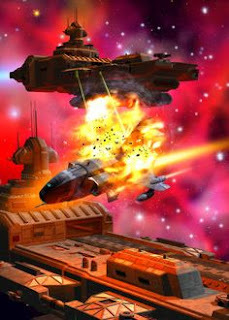
Space Battle
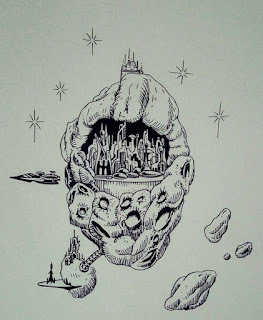
Sketch (untitled)
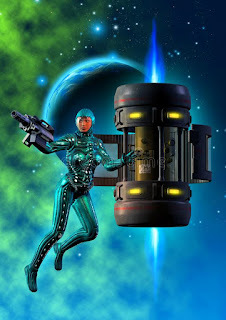
Astronaught and Dying Satellite Above Planet
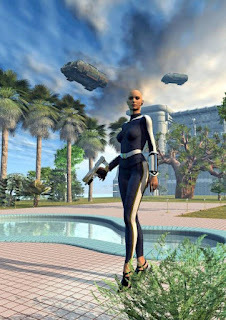
Untitled (Atmosphere)
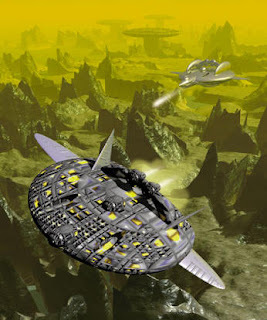
Space Battle Over Mountains
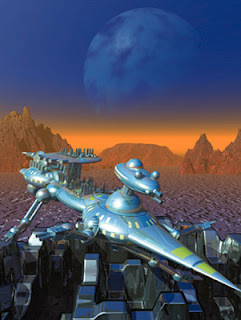
(Untitled) View of Planet
You can check out Tiziano's bio here



